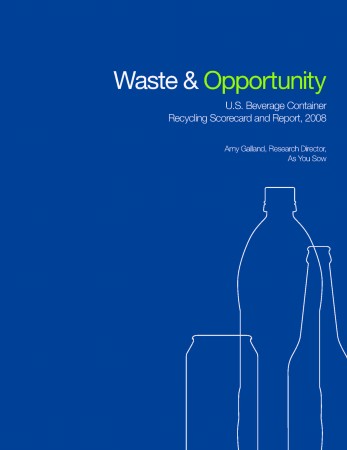The second edition of As You Sow’s beverage container recycling scorecard report evaluates new and ongoing efforts by beverage producers to:
- reduce materials use
- increase recycled content in containers
- raise recovery and recycling rates
- support public policy initiatives to increase container recycling rates
- disclose such activities to stakeholders
This report recommends corporate actions on recycling that can strengthen U.S. energy security and reduce carbon footprints and resource depletion.
The 2008 U.S. Beverage Container Recycling Scorecard and Report is based primarily on responses to As You Sow’s Beverage Container Recycling Survey, which was sent to 23 beverage companies and on publicly available information from websites and corporate social responsibility reports. Seven companies responded to the survey. The respondents to our survey control 74% of the U.S. carbonated soft drink market, over 60% of the U.S. bottled water market and almost 50% of the U.S. beer industry.
Key Findings
- In this second survey, Coca-Cola Company outranks its beverage industry peers overall. The firm is a leader in its commitments and performance on beverage container source reduction, company-wide recovery goals, and in investments in recycling programs. Coca-Cola is building a large recycling plant in South Carolina to grow availability of recycled PET plastic, appears to have the lightest 20-ounce PET carbonated soda bottle, and reports the highest percentage of recycled content in its aluminum cans. However, Coca-Cola lags PepsiCo on use of recycled content resin in PET beverage containers.
- Nestlé Waters North America showed the greatest improvement since publication of the 2006 Scorecard. Nestlé introduced its Eco-Shape® bottle, which uses the least packaging per unit of beverage for 0.5 litre containers (16.9 ounces) – the most popular size of water bottles consumed in the U.S. – and recently set an industry-wide goal of recycling 60% of PET bottles by 2018. Nestlé, along with Fiji Water, has also expressed public support for a legislative solution to significantly boost container recovery rates (a container redemption program similar to that of California). Nestlé has yet to use any recycled content in its PET bottles.
- PepsiCo reports the highest percentage use of recycled PET in its bottles, 10%. Unfortunately, PepsiCo has yet to commit to a company-specific or industry-wide beverage container recovery goal, or disclose a plan to significantly and sustainably raise beverage container recovery rates.
- Anheuser Busch has the most successful company-wide recycling program, processing five cans for every four it produces, yet it does not take the lead in recycled content. Anheuser Busch uses the standard industry ingots where both Coca-Cola and Red Bull report that they exceed the standard in their use of recycled aluminum.
- In addition to support for strong public policy on recycling, Fiji Water has the most clear and comprehensive webpages addressing container recycling. It has set admirable goals, but at the same time uses the most packaging per ounce of beverage among its major peers.
- Dr. Pepper/Snapple, maker of 7-up and Canada Dry and the third largest marketer of soft drinks in the U.S, does not have beverage container recycling goals or programs to significantly boost container recycling rates, and is the largest beverage firm not to respond to our survey. Given its size and prominence, Dr. Pepper/Snapple needs to directly engage stakeholders and consumers.
- Neither of the next largest beverage companies Cott nor National Beverage participated in the survey or publicly disclosed information on recovery and recycling or use of recycled content.



